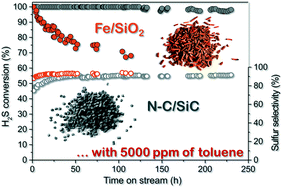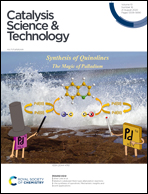A nitrogen-doped carbon-coated silicon carbide as a robust and highly efficient metal-free catalyst for sour gas desulfurization in the presence of aromatics as contaminants†
Abstract
As far as environmental chemistry is concerned, N-doped nanocarbons have been employed as efficient, selective and robust metal-free systems for the selective oxidation of H2S to elemental sulfur in tail gas treatment units. Modified Claus units that include tail gas treatments can reach up to 99.9% conversion of H2S into elemental sulfur, a technology that matches well with the more and more challenging environmental concerns. Contaminants in the feed stream include hydrocarbons whose incomplete upstream removal may pose several problems to the catalytic units of a modified Claus reactor. Indeed, when hydrocarbons meet catalysts, they may undergo degradation processes that typically cause catalyst poisoning and make necessary its frequent regeneration if not its complete substitution. This contribution describes a straightforwardly prepared mesoporous N-doped carbon coating for SiC extrudates, offering the excellent desulfurization performance of the corresponding composite (N–C/SiC) along with its remarkably high resistance towards deactivation/fouling in the presence of relatively high concentrations of toluene [1000 ppm ≤ [tol] ≤ 20 000 ppm] as aromatic contaminant. The study has unveiled the existence of a positive “solvent effect” played by toluene on the process selectivity when N–C/SiC is used as a catalyst while confirming at the same time the remarkably high H2S conversion rates and resistance to deactivation of the metal-free system under harsh reaction conditions.



 Please wait while we load your content...
Please wait while we load your content...